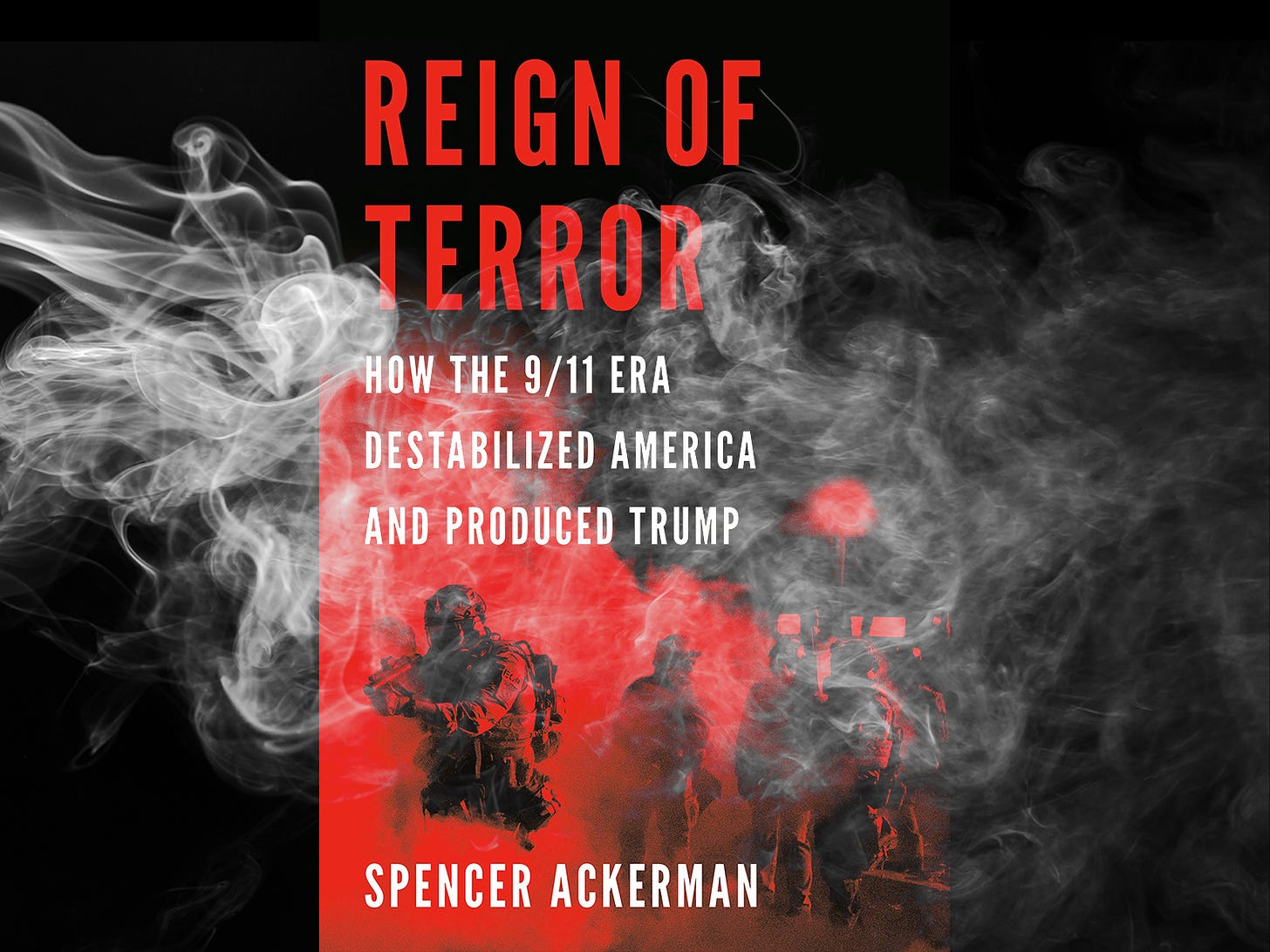Did the War on Terror Result in Trumpism?
Spencer Ackerman’s oversimplified account of the last two decades.
Reign of Terror How the 9/11 Era Destabilized America and Produced Trump by Spencer Ackerman Viking, 448 pp., $30
Can a straight line be drawn between the 9/11 attacks and the rise of Donald Trump? An affirmative answer is the startling thesis of Spencer Ackerman, a Pulitzer Prize-winning national security reporter at the Daily Beast. His stated ambition in Reign of Terror “is to confront and destroy both the War on Terror and the conditions that created it.” The work is a fierce indictment of what Ackerman calls the Security State, which he defines as “the stewards of American power: the CIA, the National Security Agency (NSA), the uniformed military, the FBI, and all the other intelligence and law-enforcement adjuncts.”
The power of the Security State, at least until 9/11, was guaranteed by “its ability to keep America safe at home.” But almost inevitably, Ackerman continues, the Security State failed. At fault was a belief in “American exceptionalism,” which according to Ackerman’s idiosyncratic definition, is “nothing more than white innocence applied globally.”
All hegemonies throughout human history have become the objects of violent resistance from those who consider themselves to be unjustly dominated. But because the United States believed itself to be exceptional, it was poorly equipped to understand that the sort of geopolitical, economic, and cultural impact it has on the world would at some point provoke a violent response.
If American exceptionalism left us vulnerable, it is also what fueled the Security State and “ensured that the response to 9/11 would be some kind of war” (emphasis in the original). The Security State was “outwardly receiving deference from a frightened public” even while it was “threatened with scapegoating for 9/11 by fearful politicians.” Under such pressure, “the Security State constructed what became known as the War on Terror.”
Although the designation “War on Terror” “elided implicating Islam” in the 9/11 attack, in actual fact, and no matter what President George W. Bush claimed about not being at war with Islam, “the War on Terror’s enemies would be exclusively Muslim.” The door was opened for torture and aggression abroad in Afghanistan and Iraq and unprecedented surveillance and repression at home, with Muslim communities “treated . . . within a framework of guilt by association.” The “true threat” to the United States, writes Ackerman, “was counterterrorism, not terrorism.” A “reign of terror” had been unleashed on the country and the world.
When Barack Obama became president, the stage was set for radical change. “By virtue of his background,” Ackerman writes, “Obama had greater potential than any rival American politician to see the War on Terror through the eyes of those it terrorized.” After all, he had spent part of his childhood in Indonesia, “where he became familiar with the exploitation of foreign and Islamic cultures by imperial powers.” Then, later, as “a professor of constitutional law and as a Black man in America, Obama had the legal scholarship and the personal experience to understand how 9/11 had inflamed white supremacy.”
But Obama, to Ackerman, proved a major disappointment. He stayed “within the American exceptionalist consensus” and the Security State remained in the saddle. While Obama was repulsed by torture, he failed to end dragnet surveillance, favoring instead only the weak remedy of increased congressional and judicial oversight. He withdrew American forces from Iraq, but was “forthright that, in some form, the Forever War would continue,” which it did in Afghanistan and elsewhere.
Worse, under Obama we entered the era of what Ackerman calls the “Sustainable War on Terror,” which heralded “a new era in institutionalized killing.” Obama “would intensify and proliferate these lethal [drone] attacks to the point where his name became synonymous with them.” Obama ended up “repudiating the civil libertarians” who had warned him that “the horrors of the War on Terror would only continue if their architects faced no reprisal.” In the end, Obama, “the locus of much antiwar hope, entrenched the War on Terror.”
The Obama presidency had yet another effect. It energized naked racial prejudice: “Only white supremacy,” writes Ackerman, “can truly explain the depth of right-wing fury at Obama, given his innumerable symbolic and substantive reassurances to whites.” In turn, the War on Terror “made birtherism urgent: a usurper, one of the enemy, held power.” The War on Terror had succeeded in “seeding the ground for a figure like Donald Trump.”
Trump, explains Ackerman, was “often misperceived as being an opponent of the War on Terror,” especially because of his “vocal derision of ‘stupid’ Mideast wars.” But in fact, once in office “he escalated the war dramatically, intensifying aerial bombing campaigns across multiple war zones.” In Ackerman’s telling, liberals wanted to “view Trump as a deviation from American history,” but Trump was merely its continuator, the fulfillment in raw form of its underlying character—domestic repression and foreign aggression—and that straight line can be drawn from 9/11 to the emergence of Donald Trump.
Reign of Terror has been widely praised. A reviewer in the New York Times hailed it as “discerning and brilliantly argued.” The Guardian’s reviewer commends Ackerman’s “masterful command of facts,” with the caveat that the author sometimes “bares his own class prejudices.” New York magazine called it “one of the most illuminating books to come out of the Trump era.”
Allow me to depart from the consensus. (Full disclosure: In my capacity as a former adviser to Mitt Romney, I am mentioned once, in passing, in the text.)
Reign of Terror is not devoid of value. Ackerman is at his best when he holds up for scrutiny the malevolent idiocies of the far right. Extremists like Lt. General Jerry Boykin, Robert Spencer, Jerry Falwell, Franklin Graham, Frank Gaffney, Stephen Miller, Rush Limbaugh, Anne Coulter, Wayne LaPierre, General Michael Flynn, flit across the pages as Ackerman makes the case that America is profoundly Islamophobic. The trouble is he eagerly conflates these provocateurs with conservatism as a whole—or at least with conservatism’s pre-Trump iteration—which leads him to draw a distorted picture of the right side of the political spectrum.
The bigger trouble is that much of the book is a tortuous left-wing rant, written in high dudgeon and made worse by execrable prose.
Consider the following sentence: “The triumphalism of the war on terror stood in conspicuous contrast with its lack of interest in its first actual battlefield.” This left me scratching my head. Who exactly has a lack of interest in the battlefield? Triumphalism?
Or consider this formulation about the rise of Obama: “The prospect of the first Black president erupted deep wells of white anxiety across the political spectrum.” Set aside the double whammy of an intransitive verb turned transitive and a nonsense metaphor—do wells erupt?—and just ponder this: Is the sentence true? Was there a deep well of white anxiety about Obama “across the political spectrum” (emphasis added)? Considering that Obama garnered 69 million votes to defeat John McCain, winning 43 percent of white voters along the way, the proposition must be judged a falsehood, evidence of a writer running away with his rhetoric. (On the same score of runaway rhetoric, is Barack Obama’s name really “synonymous” with drone strikes? Perhaps in Ackerman’s circles it is, but it’s not, I think, outside of them.)
As is often the case, sloppy writing correlates with sloppy thinking. There is, to begin with, no coherent Security State calling the shots. Yet propositions like the following dot the text:
“The Security State typically aligned with the right.”
The War on Terror “posed an inescapable danger for the Security State.”
“The Security State learned it could do business with Obama.”
“The relationship between Obama and the Security State was as wary as it was symbiotic.”
“The Security State’s actions to avert disaster kept the War on Terror perpetually on the precipice of disaster.”
And so on, and on, and on.
But the Security State to which Ackerman incessantly adverts is nothing more than a left-wing version of the “Deep State” conjured up by the MAGA and QAnon crowd.
In the real world, the U.S. government’s national security apparatus, answerable to a president and his appointees, with oversight provided by Congress and the judiciary, is an intricate organism comprising disparate bureaucracies with their own mandates, their own internal divisions, and their own sometimes parochial interests. Indeed, at one juncture, Ackerman himself seems to recognize this, and speaks of “opposing factions” within the Security State. A serious account of the last twenty years of war would not resort to a conspiratorial-sounding umbrella concept to explain the course of events.
Another problem: Ackerman buys the “blowback” explanation for the attack of September 11. As in the indented quotation above, he argues that it was American hegemony that led to an almost inevitable violent response. Ackerman himself notes that this is ground trod first in late September 2001 by Susan Sontag who argued that 9/11 was not a “‘cowardly’ attack on ‘civilization’ or ‘liberty’ or ‘humanity’ or ‘the free world’ but an attack on the world’s self-proclaimed superpower, undertaken as a consequence of specific American alliances and actions.” The same objection that was leveled at Sontag back then by Charles Krauthammer can be leveled at Ackerman today: Such explanations come perilously close to justifying al Qaeda’s assault. To put Ackerman and Sontag’s argument in balder terms, we had it coming.
Ackerman does succeed, sort of, in drawing a line connecting 9/11 to Donald Trump. Racism, white supremacism, and Islamophobia were present in America in 2001. These maladies blossomed under Trump. As Ackerman frames it, Trump comprehended something about the War on Terror that his liberal opponents failed to grasp: “He recognized that the 9/11 era’s grotesque subtext—the perception of nonwhites as marauders, even as conquerors, from hostile foreign civilizations—was its engine.” And both at home and abroad Trump revved that engine into high gear.
But seeing continuity or connection is not the same thing as proving inevitability or even likelihood or causation. Trump and Trumpism are without doubt a reflection of dark underlying social forces in the United States, but that is hardly to say that Trump’s rise and victory in 2016 were preordained. To take just one of the more curious historical hinge points, if Anthony Weiner had not been caught sexting with a minor, Hillary Clinton might well have become president instead of Trump.
To claim that a miscreant like Trump rising to the White House was the likely or inevitable outcome of 9/11 is just an imaginative way of slandering the United States. “Sick of living in America. Sick of mass hysteria” is an epigraph (drawn from punk lyrics) that Ackerman selected for his book. Given his undisguised political leanings, he chose well.





